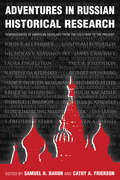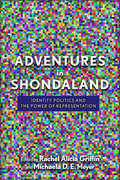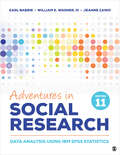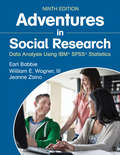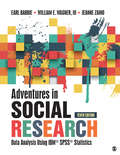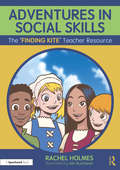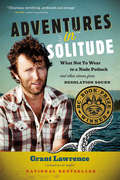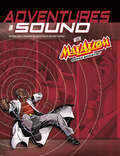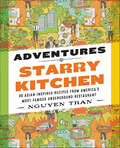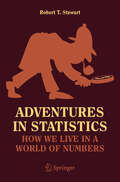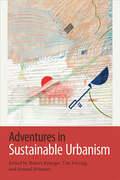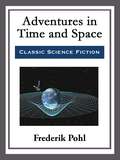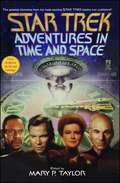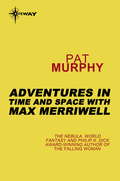- Table View
- List View
Adventures in Russian Historical Research: Reminiscences of American Scholars from the Cold War to the Present
by Samuel H. Baron Cathy FriersonAmerican historians of Russia have always been an intrepid lot. Their research trips were spent not in Cambridge or Paris, Rome or Berlin, but in Soviet dormitories with official monitors. They were seeking access to a historical record that was purposefully shrouded in secrecy, boxed up and locked away in closed archives. Their efforts, indeed their curiosity itself, sometimes raised suspicion at home as well as in a Soviet Union that did not want to be known even while it felt misunderstood. This lively volume brings together the reflections of twenty leading specialists on Russian history representing four generations. They relate their experiences as historians and researchers in Russia from the first academic exchanges in the 1950s through the Cold War years, detente, glasnost, and the first post-Soviet decade. Their often moving, acutely observed stories of Russian academic life record dramatic change both in the historical profession and in the society that they have devoted their careers to understanding.
Adventures in Senior Living: Learning How to Make Retirement Meaningful and Enjoyable
by Harold G Koenig J Lawrence DriskillIf retirement is approaching or you've recently retired, Adventures in Senior Living can help you prepare for the opportunities, needs, problems, and challenges that retirement often brings. Through 31 lively and interesting interviews, you learn how other people have found positive and rewarding ways to make their retirement years meaningful and enjoyable. Opening windows into their own lives, these inspiring retirees share with you a wide range of retirement ideas that pertain to volunteer work, travel, selecting your living arrangements, and getting involved in your community.Retirement doesn't have to bring feelings of boredom or restlessness. Adventures in Senior Living shows you that your retirement years can be your most fulfilling, productive, and fun years. You'll have more time to work in that garden you love, make quilts with your friends, spend time with your loved ones, and get exercise. But, possibly even more important than that, you'll have the ability to participate in your community on an entirely new level and to make a difference in other people's lives as well as your own. The life-loving, generous people who come together in this wonderful book are sure to inspire you as they speak about their accomplishments that include: recording books on tape for blind people conducting missionary work at home and abroad brightening the lives of patients in nursing homes and hospitals teaching Sunday school caring for a spouse with Alzheimer's delivering meals on wheels to shut-in people establishing a battered women's shelter rescuing prostitutes from the streetThis book presents retirees, teachers of courses in aging and retirement, activity directors at retirement and nursing homes, family members, and health and mental health care providers with many stories of extraordinary volunteerism, service, and kindness, but it also talks about the needs of retirees and their daily, more personal experiences. To this end, Adventures in Senior Living discusses the importance of continuing study, discussion, meditation, prayer, and fitness in the lives of seniors.
Adventures in Shondaland: Identity Politics and the Power of Representation
by Stephanie Young Vincent Pham Tina Harris Melissa Ames Mark P Orbe Michaela D.E. Meyer Rachel Alicia Griffin Richard G Jones Emily Vajjala Joan Faber McAlister Jessica L Furgerson Jennifer Billinson Jade Petermon Shadee Abdi Bernadette Calafell Myra Washington Mary Ingram-Waters Leslie Balderas Sean SwensonShonda Rhimes is one of the most powerful players in contemporary American network television. Beginning with her break-out hit series Grey’s Anatomy, she has successfully debuted Private Practice, Scandal, How to Get Away with Murder, The Catch, For The People, and Station 19. Rhimes’s work is attentive to identity politics, “post-” identity politics, power, and representation, addressing innumerable societal issues. Rhimes intentionally addresses these issues with diverse characters and story lines that center, for example, on interracial friendships and relationships, LGBTIQ relationships and parenting, the impact of disability on familial and work dynamics, and complex representations of womanhood. This volume serves as a means to theorize Rhimes’s contributions and influence by inspiring provocative conversations about television as a deeply politicized institution and exploring how Rhimes fits into the implications of twenty-first century television.
Adventures in Slow Cooking: 120 Slow Cooker Recipes for People Who Love Food
by Sarah DiGregorio“An exciting and refreshingly unbiased guide to slow cooking . . . even die-hard fans of these appliances will learn something new.” —Library Journal, starred reviewSarah DiGregorio, a James Beard nominated food writer, has reinvented slow cooking for a generation that cooks for fun and flavor, taking a fresh approach to reclaim this versatile tool without sacrificing quality or taste.Showcasing a beautiful, engaging design, inviting color photographs, and 105 original, innovative recipes thoroughly tested in a variety of brands of slow cookers, Adventures in Slow Cooking provides a repertoire of delicious food. Inside you’ll find ideas for flavorful sweet and savory slow cooker dishes, including:Whipped Feta, Red Pepper and Olive DipGranola with Pistachios, Coconut and CardamomSavory Overnight Oatmeal with Bacon, Scallions and CheddarTurkey-Spinach Meatballs Stuffed with MozzarellaSpicy Kimchi and Pork RamenOrange, Olive and Fennel Chicken TagineDaal with Mango and Mustard SeedsFarro Bowl with Smoked Salmon, Yogurt, and Everything-Bagel SpiceOxtail and Short Rib PhoCorn, Mushroom and Zucchini TamalesProper Red Sauce Eggplant ParmPeach-Orange Blossom JamMatcha-White Chocolate Pots de CrèmeCardamom-Molasses Apple Upside-Down CakeStar Anise-Black Pepper Hot ToddySarah also provides tips and tricks that will help cooks get the most out of today’s slow cookers. With a foreword by Grant Achatz, modernist chef and advocate of the slow cooker, Adventures in Slow Cooking makes this convenient appliance an indispensable tool for the modern kitchen.“DiGregorio has made the slow cooking downright sophisticated.” —Epicurious “Fun and useful. . . . DiGregorio uses a multistep approach to help build flavor in the slow cooker . . . a must-have for slow-cooker fans.” —Publishers Weekly
Adventures in Social Research: Data Analysis Using IBM SPSS Statistics
by Earl R. Babbie Jeanne S. Zaino William E. WagnerThis text provides a practical, hands-on introduction to data conceptualization, measurement, and association through active learning. Students get step-by-step instruction on data analysis using the latest version of SPSS and the most current General Social Survey data. The text starts with an introduction to computerized data analysis and the social research process, then walks users through univariate, bivariate, and multivariate analysis using SPSS. The book contains applications from across the social sciences—sociology, political science, social work, criminal justice, health—so it can be used in courses offered in any of these departments. The Eleventh Edition uses the latest general Social Survey (GSS) data, and the latest available version of SPSS. The GSS datasets now offer additional variables for more possibilities in the demonstrations and exercises within each chapter.
Adventures in Social Research: Data Analysis Using IBM SPSS Statistics
by Earl R. Babbie Jeanne S. Zaino William E. WagnerThis text provides a practical, hands-on introduction to data conceptualization, measurement, and association through active learning. Students get step-by-step instruction on data analysis using the latest version of SPSS and the most current General Social Survey data. The text starts with an introduction to computerized data analysis and the social research process, then walks users through univariate, bivariate, and multivariate analysis using SPSS. The book contains applications from across the social sciences—sociology, political science, social work, criminal justice, health—so it can be used in courses offered in any of these departments. The Eleventh Edition uses the latest general Social Survey (GSS) data, and the latest available version of SPSS. The GSS datasets now offer additional variables for more possibilities in the demonstrations and exercises within each chapter.
Adventures in Social Research: Data Analysis Using IBM® SPSS® Statistics
by Earl R. Babbie Dr William E. Wagner Jeanne S. ZainoWritten by esteemed social science research authors Earl R. Babbie, William E. Wagner, and Jeanne Zaino, Adventures in Social Research: Data Analysis Using IBM® SPSS® Statistics, Ninth Edition encourages students to practice SPSS as they read about it, providing a practical, hands-on introduction to conceptualization, measurement, and association through active learning. This fully revised workbook will guide students through step-by-step instruction on data analysis using the latest version of SPSS and the most up to date General Social Survey data. Arranged to parallel most introductory research methods texts, this text starts with an introduction to computerized data analysis and the social research process, then takes readers step-by-step through univariate, bivariate, and multivariate analysis using SPSS Statistics. In this revised edition, active and collaborative learning will be emphasized as students engage in a series of practical investigative exercises.
Adventures in Social Research: Data Analysis Using IBM® SPSS® Statistics
by Earl R. Babbie Dr William E. Wagner Jeanne S. ZainoWritten by esteemed social science research authors Earl R. Babbie, William E. Wagner, and Jeanne Zaino, Adventures in Social Research: Data Analysis Using IBM® SPSS® Statistics, Ninth Edition encourages students to practice SPSS as they read about it, providing a practical, hands-on introduction to conceptualization, measurement, and association through active learning. This fully revised workbook will guide students through step-by-step instruction on data analysis using the latest version of SPSS and the most up to date General Social Survey data. Arranged to parallel most introductory research methods texts, this text starts with an introduction to computerized data analysis and the social research process, then takes readers step-by-step through univariate, bivariate, and multivariate analysis using SPSS Statistics. In this revised edition, active and collaborative learning will be emphasized as students engage in a series of practical investigative exercises.
Adventures in Social Research: Data Analysis Using IBM® SPSS® Statistics
by Earl R. Babbie Dr William E. Wagner Jeanne S. ZainoInspire students to pursue their own adventures in social research with this practical, hands-on introduction to data conceptualization, measurement, and association through active learning. Adventures in Social Research: Data Analysis Using IBM® SPSS® Statistics from Earl Babbie, William E. Wagner, III, and Jeanne Zaino offers a practical, hands-on introduction to the logic of social science research for students in many disciplines. The fully revised Tenth Edition offers step-by-step instruction on data analysis using the latest version (24.0) of SPSS and current data from the General Social Survey. Organized to parallel most introductory research methods texts, this text starts with an introduction to computerized data analysis and the social research process, then takes readers step-by-step through univariate, bivariate, and multivariate analysis using SPSS Statistics. The range of topics, from beginning to advanced, make Adventures in Social Research appropriate for both undergraduate and graduate courses.
Adventures in Social Research: Data Analysis Using IBM® SPSS® Statistics
by Earl R. Babbie Dr William E. Wagner Jeanne S. ZainoInspire students to pursue their own adventures in social research with this practical, hands-on introduction to data conceptualization, measurement, and association through active learning. Adventures in Social Research: Data Analysis Using IBM® SPSS® Statistics from Earl Babbie, William E. Wagner, III, and Jeanne Zaino offers a practical, hands-on introduction to the logic of social science research for students in many disciplines. The fully revised Tenth Edition offers step-by-step instruction on data analysis using the latest version (24.0) of SPSS and current data from the General Social Survey. Organized to parallel most introductory research methods texts, this text starts with an introduction to computerized data analysis and the social research process, then takes readers step-by-step through univariate, bivariate, and multivariate analysis using SPSS Statistics. The range of topics, from beginning to advanced, make Adventures in Social Research appropriate for both undergraduate and graduate courses.
Adventures in Social Skills: The ‘Finding Kite’ Teacher Guide (Adventures in Social Skills)
by Rachel HolmesThis teacher resource is filled with worksheets, tasks and activities focused on developing the social skills of autistic children aged 8-12. It has been created to be used alongside the story Finding Kite: An Interactive Tudor Mystery, although activities can stand alone as a programme of intervention. Each task encourages young people to think about their own experiences, challenges and goals, building self-esteem and confidence along the way. Suitable for use in small groups or 1:1, the worksheets are flexible in design, allowing the facilitator to respond to the needs of each child. Key features of this resource include: Engaging activities divided into sections focused on ‘Making Sense of my World’ and ‘Connecting with Others’ Photocopiable and downloadable worksheets, filled with opportunities for reflection and discussion The option to use it alongside the engaging, choose your own adventure story, Finding Kite, which immerses the reader in a sensory adventure Designed for students aged 8-12, this resource provides an invaluable opportunity to build an understanding of the complexities of social dynamics. Although created with autistic girls in mind, it can be used with students of different genders and adapted for their needs.
Adventures in Solitude
by Grant LawrenceFrom Captain George Vancouver to Muriel "Curve of Time" Blanchet to Jim "Spilsbury's Coast" Spilsbury, visitors to Desolation Sound have left behind a trail of books endowing the area with a romantic aura that helps to make it British Columbia's most popular marine park. In this hilarious and captivating book, CBC personality Grant Lawrence adds a whole new chapter to the saga of this storied piece of BC coastline.Young Grant's father bought a piece of land next to the park in the 1970s, just in time to encounter the gun-toting cougar lady, left-over hippies, outlaw bikers and an assortment of other characters. In those years Desolation Sound was a place where going to the neighbours' potluck meant being met with hugs from portly naked hippies and where Russell the Hermit's school of life (boating, fishing, and rock 'n' roll) was Grant's personal Enlightenment-an influence that would take him away from the coast to a life of music and journalism and eventually back again.With rock band buddies and a few cases of beer in tow, an older, cooler Grant returns to regale us with tales of "going bush," the tempting dilemma of finding an unguarded grow-op, and his awkward struggle to convince a couple of visiting kayakers that he's a legit CBC radio host while sporting a wild beard and body wounds and gesticulating with a machete. With plenty of laugh-out-loud humour and inspired reverence, Adventures in Solitude delights us with the unique history of a place and the growth of a young man amidst the magic of Desolation Sound.
Adventures in Sound with Max Axiom Super Scientist: 4d An Augmented Reading Science Experience (Graphic Science 4d Ser.)
by Emily SohnListen up! Max Axiom is about to unravel the mysteries behind sound and how it travels through space and time. Young readers will discover, loud and clear, the truth about the super science of sound. Download the free Capstone 4D app for an augmented reality experience that goes beyond the printed page. Videos, writing prompts, discussion questions, and hands-on activities make this updated edition come alive and keep your collection current.
Adventures in Space (Short stories by Chinese and English Science Fiction writers)
by Russell James Patrick Parrinder Leah Cypess Eleanor Wood Alex Shvartsman Allen Stroud Yao Haijun Ronald Ferguson Amdi Silvestri Bao Shu Zhao Haihong Chen Zijun Han Song Wang Jinkang He XiIf you love the mission of science fiction, the interchange between cultures, the hopeful and inexorable trajectory of technology and ideas, you'll love this anthology of new stories from Chinese and English language writers.An impressive joint project, this outstanding new anthology brings the best of Chinese and English science fiction in a mediation on the theme of Exploration in Space. New, emerging, established and much-lauded writers from both cultures are brought together to demonstrate that technology and humanity when they work together bring challenges, joy and benefits to all of humankind. From Bao Shu comes 'A Trip to the End', from Allen Stroud 'The First', from He Xi 'Never Meet Again in Life', from Amdi Silvestri 'A Minuet of Corpses' and under the guiding eye of Patrick Parrinder (President of the H.G. Wells society) and Yao Haijun (celebrated editor of Science Fiction World in China) thirteen authors create a series of worlds which will enthral and entertain.
Adventures in Starry Kitchen: 88 Asian-Inspired Recipes from America's Most Famous Underground Restaurant
by Nguyen TranThe behind-the-scenes story of America’s most famous underground restaurant, featuring more than eighty-eight deceptively simple and unbelievably delicious pan-Asian recipes and dozens of luscious full color photos.In 2008, as the American economy cratered, newly unemployed Nguyen Tran and his newly unemployed wife-to-be, Thi, opened an off-the-grid eatery in their small Los Angeles studio apartment. Word of their fabulous food quickly spread, turning their culinary "speakeasy," Starry Kitchen, into an underground sensation—and the #1 Asian fusion restaurant in L.A. on Yelp. Threatened by the city’s health inspector, Nguyen and Thi transformed Starry Kitchen into an acclaimed and wildly popular pop-up restaurant in a downtown sushi joint. But their success was only beginning. As their clientele exploded, thanks to raves in the Los Angeles Times, Nguyen and Thi moved to a bigger space of their own in Chinatown, where they helped make the neighborhood the epicenter of L.A.’s burgeoning food scene. Adventures in Starry Kitchen chronicles Starry Kitchen’s DIY evolution—"this beautiful accident gone right"—the mayhem, mishaps, misdemeanors, milestones, and amazing meals that have contributed to (and nearly derailed) its success. As they tell their story, the Trans share more than eighty-eight easy-to-follow pan-Asian recipes—mouthwatering and flavorful comfort cuisine, including Claypot Striped Bass, Buttermilk Beer Beignets, Singaporean Chili Crab, Double-Fried Chicken Wings and, of course, Starry Kitchen's trademark Crispy Tofu Balls. Whether you’re cooking for two, four, or sixty, Adventures in Starry Kitchen demonstrates you don’t have to be a desperately hip (or even trained) chef to master sensational modern food that will amaze and delight.
Adventures in Statistics: How We Live in a World of Numbers (Copernicus Books)
by Robert T. StewartThis book is about how statistics play a role in life, whether in business, psychology, biology, economics, or just about anything short of basket weaving. You cannot make a trip to the doctor, watch a football game, or even go to the grocery store without some statistic staring you down. Your age, weight, and cholesterol make you a high risk for diabetes … the chance that your team will win the game is 12.5 percent … 4 out of 5 dentists like this toothpaste. What does it all mean? Adventures in Statistics: How We Live in a World of Numbers tells you what all those numbers mean. But the book does not spit out a bunch of mathematical formulas; the book tells stories. Stories that explain statistics through popular culture, sports, and history. You’re confused about that false positive warning in that drug commercial, the 2007 comedy Juno explains how medical tests – including pregnancy tests – fail and why. Not clear about what your coworkers are talking about when they say, ‘black swans.’ the 1997 blockbuster Titanic makes sense of the concept. Adventures in Statistics: How We Live in a World of Numbers shows how professionals in medicine, business, politics, sports, and many other fields use numbers. So, just about everyone would gain from reading this book, perhaps even basket weavers.
Adventures in Surfing (Fountas & Pinnell LLI Purple #Level Q)
by Sunita ApteAdventures in Surfing by Sunite Apte
Adventures in Sustainable Urbanism (SUNY Press Open Access)
by Robert Krueger; Tim Freytag; Samuel MössnerIn the context of urban sustainable development, the "details" of sustainability's current expressions perpetuate environmental injustice, untenable growth, and the destruction of functioning ecosystems. In response to this state of affairs, Adventures in Sustainable Urbanism aims to prompt new debates about the consequences of sustainable urbanism as it moves from planning to practice. Contributors explore policy, practice, and experience from cities around the world, including Calgary, Christchurch, Dortmund, Vancouver, and others. Written by scholars who live in these cities, chapters offer empirically rich descriptions for opening up new lines of thinking, theorizing, and debate about the sustainable city and its actual material expressions in place. By examining the sustainable city through various analytical framings, contributors urge readers to move from viewing the sustainable city as something everyone can agree on, to a highly politicized and contested process. Additional resources are provided for readers who may wish to extend their own research into a city or theme.SUNY Press has collaborated with Knowledge Unlatched to unlock KU Select titles. The Knowledge Unlatched titles have been made open access through libraries coming together to crowd fund the publication cost. Each monograph has been released as open access making the eBook freely available to readers worldwide. Discover more about the Knowledge Unlatched program here: https://knowledgeunlatched.org/. It can also be found in the SUNY Open Access Repository at https://soar.suny.edu/handle/20.500.12648/8435.
Adventures in Time
by Andre NortonCollected in one omnibus edition are three of Andre Norton's best known works: 'The Time Traders,' 'The Defiant Agents,' and 'Key Out of Time.' Join Ross Murdock on these three fantastic adventures in time as he's called on to save Terra again and again.
Adventures in Time and Space
by Frederik PohlCollected here are five adventures from Science Fiction Writers of America Grand Master and Science Fiction Hall of Fame member, Frederik Pohl. Each of these stories will transport you to an imaginative place and time. Pohl was one of the best science fiction writers of all time and these are some of his best stories.
Adventures in Time and Space
by Mary P. TaylorStardate 1999. To commemorate twenty years of thrilling Star Trek novels, Pocket Books is proud to present a one-of-a-kind tribute volume highlighting the most unforgettable moments from a generation of bold explorations by some of the most imaginative science fiction authors of our time! Selected by an expert Star Trek fan, Star Trek: Adventures In Time and Space contains page after page of terrific Star Trek moments. Over the course of two decades, Pocket Books has published hundreds of fantastic adventures set in the astounding universes of Star Trek, Star Trek: The Next Generation®, Star Trek: Deep Space Nine®, and Star Trek: Voyager®. Here is the crème de la crème of Starfleet's literary voyages: the most dramatic confrontations, the strangest aliens, the most deadly perils that ever tested Kirk, Picard, Sisko, Janeway, and their valiant crews. Journey backwards through time to sample the best the future has to offer! SPECIAL BONUS FEATURE: The Star Trek Novel Chronology, showing where each book falls in the grand Star Trek saga -- because readers demanded it!
Adventures in Time and Space with Max Merriwell: The Complete Novels Wild Angel And Adventures In Time And Space With Max Merriwell
by Pat MurphySusan Galina and her friend Pat have escaped their normal lives into the elegant, isolated world of the Odyssey, a luxury cruise ship heading from New York to Europe via Bermuda. Pat is working on her doctoral thesis in quantum physics, and Susan is recovering from a recent and unhappy divorce.To Susan's delight, she discovers that her favourite author, Max Merriwell, is also aboard ship, teaching a writers' workshop. Susan's life becomes even more interesting when she meets Tom Clayton, the handsome chief of security. This cruise looks very promising indeed. But the pleasant shipboard vacation turns dark as the Odyssey passes into the Bermuda Triangle. Each year, Max Merriwell writes three novels: a science fiction novel under his own name, a fantasy novel under the pseudonym Mary Maxwell, and a mystery novel under the pseudonym Weldon Merrimax. The trouble begins when Max receives a threatening note that appears to come from Weldon Merrimax, Max's own pseudonym. Susan hears wolves howling in the night, the ship's passengers are seized with a dancing mania, and monsters lurk in the ship's corridors. An eyewitness reports a murder - but the victim of the crime is not on the passenger list and the body is nowhere to be found. While others struggle to understand these strange events, Pat seeks the explanation in quantum theory.


